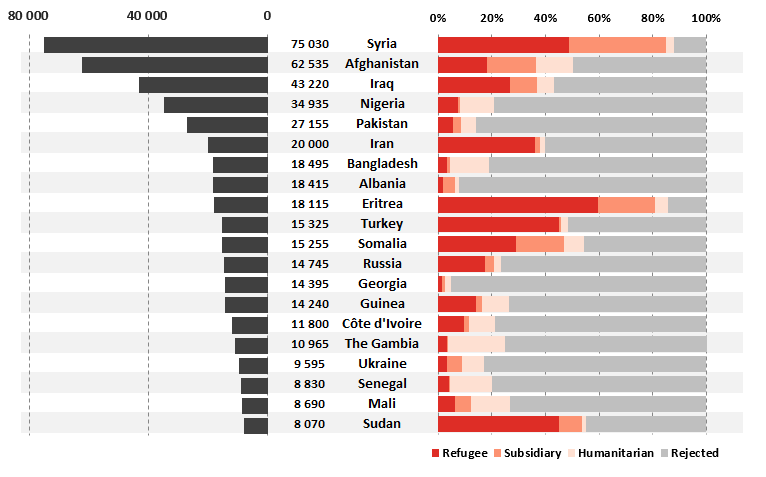Most first-instance decisions were issued to nationals of the three main countries of origin in terms of applications lodged (Figure 13). Syrians returned to be the citizenship receiving the most decisions (75 030), after decision-making in EU+ countries in 2017 was heavily focused on Afghan applicants. The latter received 62 535 decisions in 2018, followed by Iraqi nationals (43 220). Jointly, these three citizenships received slightly fewer than one third of all first-instance decisions issued in the EU+.
Most citizenships received fewer decisions than in 2017. For instance, in 2018 Syrian applicants received half as many decisions compared to 2017; the decline was even more evident for Afghans (- 65 %) and Iraqis (- 57 %). On the other hand, a limited number of citizenships received more decisions in 2018. This was the case, for instance, for Salvadorians (+124 %), Colombians (+111 %), Moldovans (+ 70 %), Georgians (+ 57 %), Chadians (+47 %), and Ivoirians (+ 34 %) 120.
It is also important to analyse the underlying composition of first instance decisions’ outcomes. For instance, applicants from most citizenships of origin were granted primarily EU-regulated forms of protection. 121 Almost all of the positive decisions issued to Turkish (93 %) and Iranian (91 %) applicants granted refugee status. Subsidiary protection accounted for the majority of positive decisions issued to applicants coming from only three countries: Libya (71 %), Yemen (69 %) and Albania (61 %). For some others, the vast majority of decisions granted humanitarian forms of protection: these were Ghanaians (88 % of all positive decisions), Gambians (85 %), Senegalese (77 %) and Bangladeshis (76 %), among others. The majority of decisions to each of these four citizenships were issued by Italy, where humanitarian protection is applicable.
|
Number of first-instance decisions (left) issued in 2018 and outcome (right), by country of origin. |
 |
|
Figure 13: Syrians resulted to be the citizenship receiving the most first-instance decisions |
____
120 For citizenships with at least 1 000 decisions issued in the EU+ in 2018.
121 For citizenships with at least 1 000 decisions issued in the EU+ in 2018.
